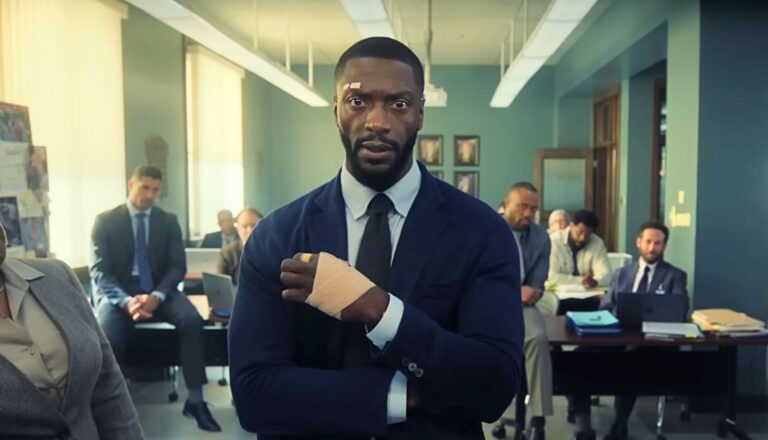
Cross
Though it’s compelling, the content concerns in Prime Video’s ‘Cross’ might be enough to cross it off your watch list.

We’ll go right out and admit it: sometimes, keeping the peace with your family is tough—especially when one of them is writing a secret novel about the rest of them behind their backs.
But how could Tom Hayworth not do that? For starters, his younger brother, Connor, is a Bay Area millionaire who literally just bought his house from Matt Damon. By contrast, his ever-political sister, Sarah, lives in a cramped apartment with her wife and two children. Meanwhile, Tom’s a middle-class writer struggling for his big break—and the antics they all get into as a family is the perfect writing material.
Of course, Tom’s family does find out about his novel. After all, it was bound to happen with all the note-taking and secret scheming he’s been doing around them. The reaction? Honestly, much better than we would’ve guessed. Sure, they’re a bit hurt at first, but they all generally come around to the idea after realizing that Tom’s depictions of them aren’t far from reality.
But now that the family is aware of Tom’s book, there remains a whole host of other issues—like, maybe Tom’s parents want themselves to be portrayed a certain way. Or maybe a publisher offers exuberant amounts of money if Tom changes significant portions of the novel.
And that doesn’t even touch on the issues that’ll arise when the book is finally finished and ready for publishing.
In each instance, Tom’s going to have to make a choice: familial relationships…or money?
Comedy is easier when your characters are (more or less) walking stereotypes. Home Economics is proof.
Sarah’s the unemployed vegan liberal whose sense of self-righteousness causes her to find a million things to complain about and few people to befriend her. Tom’s the middle-class father whose brain is so wrapped around the family finances that he often forgets to nurture his relationships, including that with his maybe-definitely alcoholic wife. Connor’s the dopey millionaire with marital issues whose wealth keeps him out of touch with the rest of his siblings (and everyone else in a lower tax bracket).
In any other show, there’s little chance these characters would ever hang out in one another’s social circles. But when you’re family, there are always reasons to visit.
As the siblings bicker, argue and get themselves into strange scenarios, we’ll be exposed to some concerns. Sarah’s a married lesbian, for one. For another, we’ll deal with sexual references (including to pornography and masturbation) and multiple instances of God’s name being taken in vain. Characters (namely, Tom’s wife) will often be seen drinking, and there’s a reference to marijuana, too.
Granted, each episode generally ends with the family reconciling, coming together against all malice, envy and outside influence. They’ll frequently be reminded that, though they all live in vastly different economic situations, they’re still family. That’s a nice message.
But is that message bullish enough to make you invest in Home Economics despite the concerning content? Let the reader decide.
Brother and sister Tom and Sarah visit their younger brother, Connor, in his expensive home, where Tom plans to ask him for a loan.
Tom exclaims that a kid’s playroom is “like they’re inside Barbie’s uterus.” Tom dodges an uncomfortable question by saying that he and his wife, Marina, are “having a sexual problem.” Marina says “Mommy needs a new breast pump” while rolling dice during Monopoly. Connor’s wife is said to have cheated on him, even after Connor refused his “super-hot Pilates teacher’s” advances. Sarah is a lesbian, and she has a wife, Denise. A girl asks for a doll’s pronouns.
The siblings drink beer, and we hear other references to alcohol. Marina drinks wine.
Tom runs his vehicle into another car. He also slips on a treadmill and is thrown by it into a concrete wall. A boy references defecation. Denise believes in astrology.
“H—” is used once, and “screw” is used twice. God’s name is used in vain four times.
Tom’s family finally discovers the subject of Tom’s book: them. While fighting about the news, the angry family members accidentally lock themselves in Connor’s wine cellar.
We hear a reference to Tom’s dad having an affair, and he makes a couple of references to how attractive his wife is. A woman identifies as bisexual, and she tells Tom that he should change Connor’s book character to have a sexual “kink.” She also mentions marketing Tom’s book to the Fifty Shades of Grey crowd.
Hundreds of bottles of wine burst in an accident. A woman says her last clients were “cancelled for racist Tweets.” There’s a reference to Scotch and other alcoholic beverages.
“H—” is used four times. “Dang” is used once. God’s name is inappropriately used four times.
The Hayworths attend a 49ers football game, causing a non-jock Tom to get into awkward situations.
Sarah says that the NFL says “football is gay now.” Cheerleaders dance in tight and revealing outfits. A man references “sex positivity.” Tom is seen in a speedo swimsuit.
A man burps. We hear a reference to vomit and another to defecation. People drink various types of alcohol. Marina does the sign of the cross.
“A—” is used once. God’s name is misused seven times.
Connor is Tom’s new boss—but Tom doesn’t yet know it. To soften the blow of the news, Connor decides to take the siblings and their families to the “happiest place on Earth.”
Denise explains how in vitro fertilization works, making references to sperm and eggs. Tom exclaims his need to use the bathroom. Disney merchandise pushes LGBT pride.

Kennedy Unthank studied journalism at the University of Missouri. He knew he wanted to write for a living when he won a contest for “best fantasy story” while in the 4th grade. What he didn’t know at the time, however, was that he was the only person to submit a story. Regardless, the seed was planted. Kennedy collects and plays board games in his free time, and he loves to talk about biblical apologetics. He’s also an avid cook. He thinks the ending of Lost “wasn’t that bad.”

Though it’s compelling, the content concerns in Prime Video’s ‘Cross’ might be enough to cross it off your watch list.

‘The ‘Burbs’ is Peacock’s attempt to adapt the 1989 movie of the same name. But a fresh coat of paint doesn’t hide the content issues.

Don’t be fooled by the show’s teenage characters. Parents would be advised not to let their own teens be haunted by its content.

‘Drops of God’ focuses on a wine-centric competition, and it comes with notes of sexual content and some crude language, too.